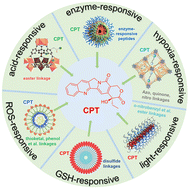Camptothecin-based prodrug nanomedicines for cancer therapy
Abstract
Camptothecin (CPT) is a cytotoxic alkaloid that attenuates the replication of cancer cells via blocking DNA topoisomerase 1. Despite its encouraging and wide-spectrum antitumour activity, its application is significantly restricted owing to its instability, low solubility, significant toxicity, and acquired tumour cell resistance. This has resulted in the development of many CPT-based therapeutic agents, especially CPT-based nanomedicines, with improved pharmacokinetic and pharmacodynamic profiles. Specifically, smart CPT-based prodrug nanomedicines with stimuli-responsive release capacity have been extensively explored owing to the advantages such as high drug loading, improved stability, and decreased potential toxicity caused by the carrier materials in comparison with normal nanodrugs and traditional delivery systems. In this review, the potential strategies and applications of CPT-based nanoprodrugs for enhanced CPT delivery toward cancer cells are summarized. We appraise in detail the chemical structures and release mechanisms of these nanoprodrugs and guide materials chemists to develop more powerful nanomedicines that have real clinical therapeutic capacities.

- This article is part of the themed collection: Recent Review Articles


 Please wait while we load your content...
Please wait while we load your content...